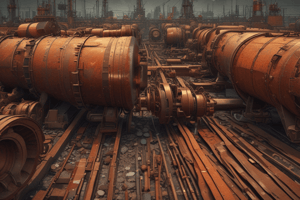Podcast
Questions and Answers
Which type of corrosion occurs when two dissimilar metals are in contact?
Which type of corrosion occurs when two dissimilar metals are in contact?
- Pitting corrosion
- Galvanic corrosion (correct)
- Uniform corrosion
- Intergranular corrosion
What is the primary purpose of cathodic protection in corrosion prevention?
What is the primary purpose of cathodic protection in corrosion prevention?
- To provide a physical barrier between the metal and the corrosive environment
- To reverse the corrosion reaction by applying an electric current (correct)
- To introduce inhibitors to the environment
- To increase the metal's resistance to corrosion by altering its surface composition
Which of the following is NOT a factor affecting corrosion?
Which of the following is NOT a factor affecting corrosion?
- Oxygen availability
- Material thickness (correct)
- Presence of corrosive substances
- Surface finish and cleanliness
What type of corrosion is characterized by localized damage in the form of small holes or pits?
What type of corrosion is characterized by localized damage in the form of small holes or pits?
Which of the following is NOT a corrosion prevention method?
Which of the following is NOT a corrosion prevention method?
What is a common laboratory test used to assess corrosion resistance?
What is a common laboratory test used to assess corrosion resistance?
Which of the following is an example of a coating used for corrosion prevention?
Which of the following is an example of a coating used for corrosion prevention?
What type of corrosion occurs in small, confined spaces, such as under gaskets or washers?
What type of corrosion occurs in small, confined spaces, such as under gaskets or washers?
What is the primary role of inhibitors in corrosion prevention?
What is the primary role of inhibitors in corrosion prevention?
Which of the following is a technique used for monitoring corrosion?
Which of the following is a technique used for monitoring corrosion?
Flashcards are hidden until you start studying
Study Notes
Definition and Types of Corrosion
- Corrosion: a naturally occurring process that involves the deterioration of materials, usually metals, due to chemical reactions with their environment.
- Types of corrosion:
- Uniform corrosion: even deterioration of the material surface.
- Pitting corrosion: localized damage in the form of small holes or pits.
- Crevice corrosion: corrosion that occurs in small, confined spaces.
- Galvanic corrosion: corrosion that occurs when two dissimilar metals are in contact.
- Intergranular corrosion: corrosion that occurs along the grain boundaries of a metal.
Factors Affecting Corrosion
- Environmental factors:
- Humidity
- Temperature
- Presence of corrosive substances (e.g., acid, saltwater)
- Material factors:
- Type of material (e.g., iron, copper, aluminum)
- Surface finish and cleanliness
- Presence of impurities or defects
- Other factors:
- Oxygen availability
- Presence of microorganisms (e.g., bacteria, fungi)
Corrosion Prevention Methods
- Coatings and linings:
- Paints and varnishes
- Metallic coatings (e.g., zinc, tin)
- Ceramic and polymeric coatings
- Cathodic protection:
- Applying an electric current to drive the corrosion reaction in the opposite direction
- Inhibitors:
- Adding substances to the environment to slow down or stop corrosion
- Design and maintenance:
- Designing structures and equipment to minimize corrosion risks
- Regular cleaning, inspection, and maintenance
Corrosion Testing and Monitoring
- Laboratory tests:
- Immersion tests
- Salt spray tests
- Humidity tests
- Field tests:
- Exposure tests
- Coupon tests
- Monitoring techniques:
- Visual inspection
- Electrochemical measurements
- Acoustic emission testing
Definition and Types of Corrosion
- Corrosion is a natural process that involves the deterioration of materials, usually metals, due to chemical reactions with their environment.
- Types of corrosion include:
- Uniform corrosion, which is an even deterioration of the material surface.
- Pitting corrosion, which is localized damage in the form of small holes or pits.
- Crevice corrosion, which occurs in small, confined spaces.
- Galvanic corrosion, which occurs when two dissimilar metals are in contact.
- Intergranular corrosion, which occurs along the grain boundaries of a metal.
Factors Affecting Corrosion
- Environmental factors that affect corrosion include:
- Humidity
- Temperature
- Presence of corrosive substances (e.g., acid, saltwater)
- Material factors that affect corrosion include:
- Type of material (e.g., iron, copper, aluminum)
- Surface finish and cleanliness
- Presence of impurities or defects
- Other factors that affect corrosion include:
- Oxygen availability
- Presence of microorganisms (e.g., bacteria, fungi)
Corrosion Prevention Methods
- Coatings and linings can prevent corrosion, including:
- Paints and varnishes
- Metallic coatings (e.g., zinc, tin)
- Ceramic and polymeric coatings
- Cathodic protection involves applying an electric current to drive the corrosion reaction in the opposite direction.
- Inhibitors can be added to the environment to slow down or stop corrosion.
- Design and maintenance practices can also prevent corrosion, including:
- Designing structures and equipment to minimize corrosion risks
- Regular cleaning, inspection, and maintenance
Corrosion Testing and Monitoring
- Laboratory tests for corrosion include:
- Immersion tests
- Salt spray tests
- Humidity tests
- Field tests for corrosion include:
- Exposure tests
- Coupon tests
- Monitoring techniques for corrosion include:
- Visual inspection
- Electrochemical measurements
- Acoustic emission testing
Studying That Suits You
Use AI to generate personalized quizzes and flashcards to suit your learning preferences.




